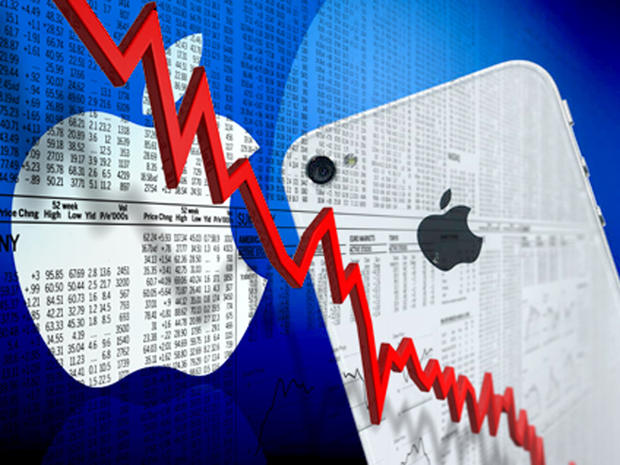Why these money managers don't own Apple
(CBS/AP) BOSTON — A mutual fund manager usually can count on having a good year if the largest investment is surging. But that's not the case for Tony Trzcinka.
The largest holding in his Pax World Growth Fund is Apple Inc. (AAPL), and shares of the technology icon are up 44 percent — four times more than the broader market. Yet Trzcinka is being questioned about the fund's 12.5 percent return. Though that's a strong result just four months into the year, it trails more than 80 percent of the fund's large-cap growth stock peers.
"It's related to one stock: Apple," says Trzcinka, whose strong long-term record has earned the fund a 4-star rating from Morningstar.
Stock of the world's most valuable company recently made up 2.5 percent of the fund. It's not an unusually large position, but it's the fund's biggest single holding, slightly more than second and third-largest ones, Google Inc. (GOOG) and Qualcomm Inc. (QCOM).
4 signs your financial advisor is dangerous
Why you shouldn't stock up on Apple shares
Life's financial questions answered with crisp clarity
Apple shares are so valuable that they make up nearly 7 percent of a growth-stock index that Pax World Growth (PXWGX) uses as a benchmark. So Trzcinka would need to nearly triple the fund's stake in Apple to align with the index.
With its enormous weighting in the market and strong recent gains, Apple is having a huge impact on performance of large-cap growth funds this year. With a few exceptions, those owning a lot of Apple are beating a majority of their peers. Most large-growth funds that own relatively little Apple are lagging.
One example: Nearly 18 percent of the Matthew 25 fund (MXXVX) was recently invested in Apple, and the fund's 23 percent return this year is in the top 1 percent among large-cap growth funds.
Apple's importance to large-growth mutual funds has become so great that managers face a crucial question. For most, it's a matter of how much Apple to own, not whether to own it or not.
More than 84 percent of large-growth funds own Apple, according to a recent Morningstar analysis.
Even funds that normally wouldn't invest in a growth-oriented stock like Apple are getting in. Morningstar found that one of every five value-oriented funds owns Apple.
The case for Apple is easy to see. The company reported selling 35 million iPhones in the first quarter, almost twice as many as a year ago. Its earnings were $11.6 billion, nearly double the year-ago total, and revenue jumped 59 percent. Apple beat analysts' expectations on both key performance measures.
Yet there are large-growth fund managers like Trzcinka who continue to argue that Apple isn't necessarily a great investment. He says Apple has top products, but believes long-term prospects aren't as good as the stock's price implies.
"Its revenue projections assume that every new product introduction will be a hit," Trzcinka says. "This is especially worrisome given Apple's short product cycle."
He also says there seems to be little attention paid to the possibility of competition taking market share or cutting into margins.
The latter scenario is a key reason why Aziz Hamzaogullari hasn't bought any Apple stock in the two years he's run the Loomis Sayles Growth Fund (LGRRX). The stock's absence is one reason that the fund trails 90 percent of its large-growth peers this year, even with an 11.7 percent return.
Hamzaogullari acknowledges Apple's strengths, but says it's not a good fit in a portfolio that he's managing for long-term results. He tends to hold stocks for several years.
Consumer products companies tend to attract more competition than firms making products for corporate or government clients, he notes. And he sees the competition heating up for Apple, which could erode its profit margin and market share. The iPhone already faces a threat from mobile phone companies that are promoting cheaper phones running Google's Android software.
Hamzaogullari says it's worth remembering the difficulties that two of Apple's rivals have faced in recent years. In the past decade, Nokia Corp. (NOK) and BlackBerry-maker Research in Motion Ltd. (RIMM) both had a sizeable share of the mobile device market and strong growth prospects.
The iPhone generates about half of Apple's profits, but Hamzaogullari says that will be hard to maintain.
One reason the phones are such hot sellers in the U.S. is that mobile providers typically subsidize the cost, and make back their expense through monthly service fees over the life of a customer's contract. It's a model that has worked for Apple and the providers that sell iPhones in the U.S. and some developed countries.
But Apple could have a tough time expanding into more populous emerging markets because prepaid mobile service plans are common there. Those plans typically require consumers to pay the full price of a phone upfront. Hamzaogullari believes Apple will have less success selling its premium smartphones in developing countries where consumers live on more modest means.
So he's comfortable being an Apple holdout, even if its absence from his fund's portfolio may hurt short-term results.
When selecting investments, Hamzaogullari says he's not considering what his fund's peers are investing in. Instead, he considers whether a stock might perform well over a minimum of five years or longer.
With Apple, he says, "In the end, we believe that its margins, market share and the business model are not sustainable."
